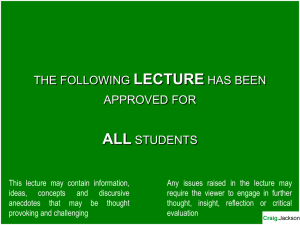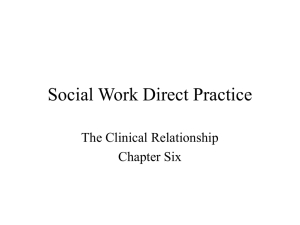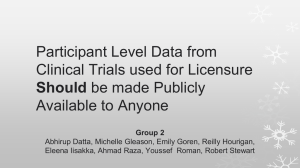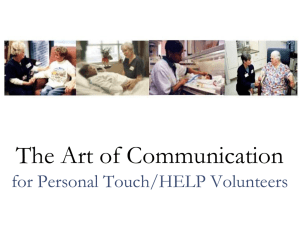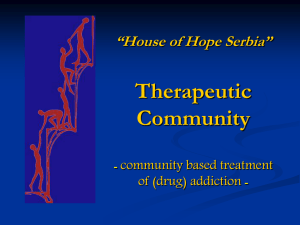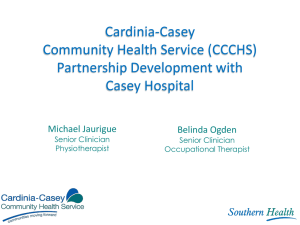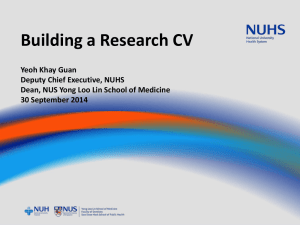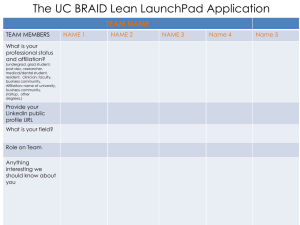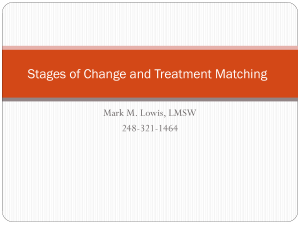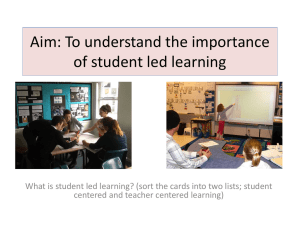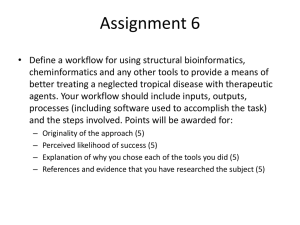OO-Tracker-presentation-Dianne-Tetley-Outcome-Oriented
advertisement
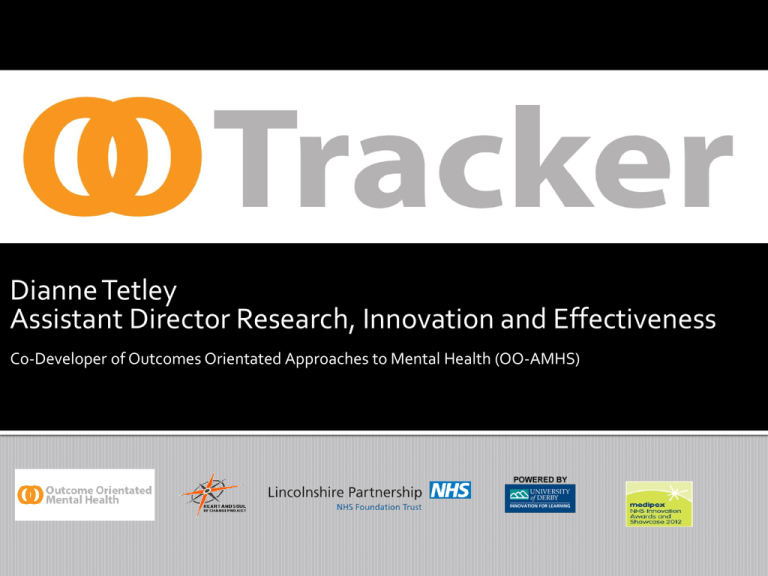
Dianne Tetley Assistant Director Research, Innovation and Effectiveness Co-Developer of Outcomes Orientated Approaches to Mental Health (OO-AMHS) Only 15% of patients with mental health problems recover (Centre for Social Justice, 2012) 24% entering community CAMHS get worse A need to report recovery metrics in addition to activity metrics (DoH, ‘Closing the Gap’, 2014) A feasible online feedback/data management system is required for reporting recovery With clinical utility Incorporates brief PROM measures that address factors that are most likely to influence therapeutic outcome Permits charting of therapeutic progress for patient and clinician Aggregates outcomes data 3 Research finds therapy is effective for mental health problems (70%) Model or technique has a minimal impact on outcomes. Extra-therapeutic factors such as social circumstances and motivation have biggest impact on outcomes Quality of therapeutic alliance important. Regular monitoring of progress and alliance improves outcomes (10 RCTs). 4 40.0% Spontaneous Remission Client/Extra-therapeutic Common Factors Models/Techniques 30.0% 15.0% Relationship 15.0% Placebo/Hope/Expectancy Lambert, M. (1986). Implications of Psychotherapy Outcome Research for Eclectic Psychotherapy. In J. Norcross (Ed.) Handbook of Eclectic Psychotherapy. New York: Brunner/Mazel. 5 6 CONSULTATION: pay attention to extratherapeutic factors OUTCOME: Monitor outcome session-by-session. If no change by session 5, review with patient and MDT. RELATIONSHIP: Monitor the alliance session-bysession. ETHICS OF CARE: Develop a whole team ethos. Teams are the drivers of change. 7 A secure web-based automatic feedback and data management system that supports the practical application of an Outcomes Orientated Approach to the delivery of Mental Health Services (OO-AMHS) for adults and children. A therapeutic tool that supports clinician decision making An electronic feedback system that incorporates session by session PROMS suitable for use in mental health Powerful reporting capability reporting outcomes for individual clinician, team, service for PbR cluster, treatment or diagnosis Supports the development of team ethos and supervisory structures Supports dialogue between service users, carers and clinician empowering them to have a voice and choice in the treatment and care they receive 9 Speed up adoption of OO-AMHS innovation in clinical practice Automatically generate on-going, session by session patient related outcome data from use of ultra brief measures in terms of clinical improvement or deterioration Build a culture of partnership and collaboration by developing team cultures that are recovery focused and support the use of outcomes data for clinical reflection, supervision and whole team development Support engagement with service users and carers and promote dialogue between them and their clinician ensuring their preferences are discussed 10 At the start of the session Outcomes Rating Scale (ORS) At the end of the session Session Rating Scale (SRS) 11 OO-Tracker, provides electronic administration of ORS and SRS with direct input by each service user and/or carer, session-by-session Captures scores automatically Charts progress and therapeutic alliance graphically Allows clinicians to provide verbal and visual ‘real-time’ session-by-session feedback to service users and their carer/s (when appropriate) 12 OO-Tracker has an in-built early warning system (traffic light) Alerts clinicians to individuals at risk of poor clinical outcome and helps identify those who have reached likely maximum expected benefits from services received. Avoids individuals getting stuck in long term treatment with little change or benefit Avoids early ‘drop-out’ from treatment and DNAs (Did Not Attend). Serves as a prompt for clinicians and supervisors highlighting cases for team or supervisory discussion. This may lead to improvement as a result of change in therapeutic approach or change of clinician. 13 Discuss with patient Discuss with family Discuss with MDT/supervision Change approach Change clinician Carry on for agreed period. 14 Reports by patient, clinician, supervisor, manager. Will collate reports by cluster, team, intervention type. 15 OO-Tracker is simple, cheap and easy to use Requires minimal training Supports OO-AMHS implementation and helps clinicians to maximise existing skills by working more productively Direct patient entry avoids the need for costly administrative support It’s bespoke data-base and online ORS/SRS administration system enables ongoing feasible data tracking of outcomes orientated indicators (OOI’s) It’s powerful reporting capability provides outcomes data to be aggregated with one ‘click’ 16 Improvement in the quality of NHS mental health care Efficiency savings – decreasing costs and increasing capacity Development of positive therapeutic relationships and dialogue between service user and clinician, ensuring services respond to their preferences 17 Increased recovery rates Identification of those with no signs of reliable improvement/change Reduction in long-term use of services of no benefit Reduction in DNA’s Avoidance of early drop-out from treatment Improved therapeutic efficiency and positive therapeutic relationship 18 53% reduction in cases receiving service for over two years to 18% Annual inpatient referrals dropped from 15 to 3 Significant drop in none attendance rates 900 discharged cases – 76% showed clinically significant improvement (above clinical cut off) Only 7% deteriorated CAMHS capacity increased – Tier 2 services have doubled capacity with the same number of staff, largely due to a dramatic increase in the length of time patients require treatment 19 Reduction in cases receiving service for over two years from 34% to 18% Reduction in cases receiving service for over one years from 59% to 29% Discharged over 450 cases (analysis of 344). 77% clinically significant positive change, 17% no change, 6% deteriorated. 20 Discharged: 83 patients (as keyworker). 80% clinically significant positive change, 17% no change, 3% deteriorated. Effect size: 1.4 Average change on ORS: +10.9 21 Current follow up outpatient DNA rate in LPFT adult mental health services: 19% ST DNA rate 6 months to April 2014: 3% Do you know how many are getting better? Do you know how many are discharged significantly better or worse? 22 OO-Tracker is available to clinicians using OO-AMHS delivery in clinical practice OO-AMHS training is available via 8 online interactive e-learning modules Train the trainer course (incorporating above e-learning) has been accredited by the British Psychological Society A service transformation toolkit (book)published to support implementation Online OO-Tracker User Guide, including video available 23 ‘NHS East Midlands Innovation Award: OO-CAMHS (2010) – An Outcome Orientated Approach to the Delivery of Child and Adolescent Mental Health Services’ www.oocamhs.com ‘East Midlands, Health, Education and Innovation Clusters (HEIC) Innovation Award (2011): OO-AMHS Training Staff, Supervisors and Managers in Outcome Orientated Approaches to the Delivery of Mental Health Services: An e-learning Package’ www.innovationforlearning.com/LPFT/ ‘East Midlands, Health, Education and Innovation Clusters (HEIC) Innovation Award (2012): National Role Out of the OO-AMHS e-Learning Package: Training NSPCC Clinical Practitioners and Managers in an Outcome Orientated Approach to the Delivery of Face-to-Face Services for Looked After Children’ Medipex – ‘Yorkshire, Humber and East Midlands Innovation Champions of the Year’ (2012-13) Academic Health Science Network (ASHN) Innovation Finalist (2014) 24 Lincolnshire commissioners supported implementation across Lincolnshire CAMHS Services – CQUIN Implementation in North East Lincolnshire CAMHS (Grimsby) Request to implement across 9 LPfT integrated CMHT’s National CYP IAPT programme has endorsed the use of the ORS and SRS in their routine outcome monitoring Joint application to the Health Foundation with CORC and Roehampton University to roll out OO-AMHS with OOTracker to 8 sites in England NSPCC rolled out nationally across England and N. Ireland Headspace – Australia national youth mental health foundation to implement OO-Tracker November 2014 Interest from numerous NHS mental health providers and social enterprises 25 Questions 26
